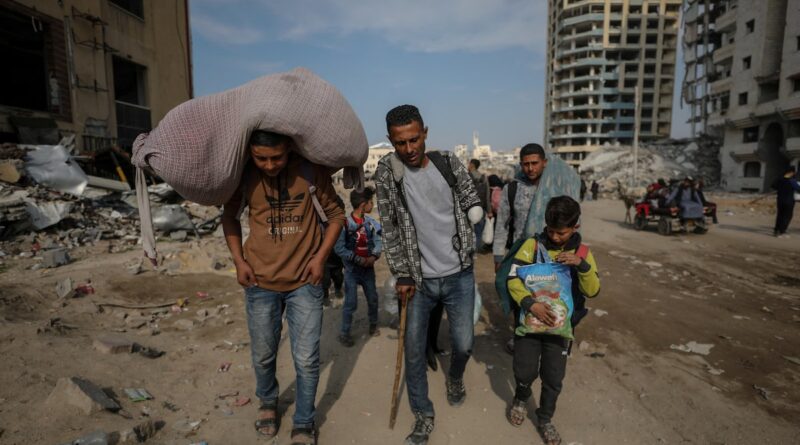Morning Update: Trump, Gaza and the $80-billion question
Good morning. As Donald Trump floats a Gaza takeover, displaced Palestinian families make their way back home. More on that below, along with a potential China reset and an ugly Oscars race, but first:
Today’s headlines
Ismael Mohammed, 47, and his family return home to Jabalia in northern Gaza.Dawoud Abu Alkas/Reuters
Middle East
The long road home
Donald Trump’s pledge to “take over” Gaza, “own it,” and turn it into the “Riviera of the Middle East” may have been unprecedented – and could amount to a gross violation of international law – but the language he used to describe Gaza is awfully familiar. It’s “a hellhole,” the U.S. President said, leaning on a term he has variously deployed for Haiti, Africa, Manhattan, Washington, America in general, and Brussels. Secretary of State Marco Rubio, picking up what Trump put down, posted that “the United States stands ready to lead and Make Gaza Beautiful Again.”
After nearly 16 months of war between Israel and Hamas, it is hard to fathom the scale of destruction in Gaza – the worst since the Second World War, according to the United Nations, which estimates that Israel’s bombardment has buried the territory in 50 million tonnes of rubble. Two-thirds of the infrastructure is either damaged or destroyed, and the Gaza Health Ministry believes 10,000 bodies remain missing under the debris. “The UN recently said that the cost of rebuilding Gaza could reach US$80-billion,” The Globe’s European bureau chief Eric Reguly writes. “The financial and political obstacles are so daunting that the effort could take decades, and might not happen at all.”
Still, in the weeks since the start of the ceasefire, at least half a million displaced Palestinians have returned to whatever remains of their homes in northern Gaza. Photographers Ramadan Abed and Dawoud Abu Alkas joined the Mohammad family on their trek from a congested camp in Deir al-Balah in the southern Strip to their house in Jabalia, flattened by an air strike, 18 kilometres away. Here are some of the images from that journey.
The Mohammed family by their tent in the Deir al-Balah camp.Ramadan Abed/Reuters
Ismael Mohammed, 47, fled Jabalia early in the war alongside his wife, Badreya, their six children – ranging in age from 25 to 5 years old – and their daughter-in-law and two young grandkids. They’d learned from relatives that their home in Jabalia had been destroyed, but were ready to leave the Deir Al-Balah camp as soon as the ceasefire was announced. “Shrapnel passed by the children while they were sleeping here,” Badreya said. “It went through the cover while I was here in the tent. The children were sick from fear.”
Ismael’s five-year-old son, Mohammed, stops for water on the road home.Dawoud Abu Alkas/Reuters
Cars in Gaza are rare and expensive to hire, and drivers must queue for hours at Israeli checkpoints. Like most families heading home, the Mohammads walked. Ismael lost his arm to diabetes before the war; last year, his leg was injured in an Israeli air strike, and now he can only hobble. Everyone except the youngest children carried large packs heavy with clothes, bedding, cookware, food and water. The road crossed districts of near total ruin.
The remnants of their house in Jabalia.Dawoud Abu Alkas/Reuters
In Jabalia, they found much of their neighbourhood had been flattened, the roof and upper storey of their home buckled onto the ground floor. A reunion with a neighbour provided a brief reprieve, then Ismael began searching for belongings among the rubble. “There is joy, but it’s not complete. There is no home,” he said. “I do not know how I am going to sleep tonight.”
Abdulrahman with a toy he retrieved from the rubble.Dawoud Abu Alkas/Reuters
Abdulrahman, 8, pulled a toy from a pile of broken concrete. Later, he and his 10-year-old brother, Yasser, fashioned a swing from a rope in the wreckage. The family built a fire on the ground nearby and lay down to rest on pillows and rugs.
The brothers play near their destroyed home.Dawoud Abu Alkas/Reuters
The Mohammads hope the ceasefire will hold and let them rebuild. When the Palestinian Authority controlled Gaza, Ismael had a job in the security forces, but after Hamas took over in 2007, he said he was told not to return. He would now like to find work selling cooked, salted beans – a traditional snack – by the roadside in Jabalia.
The Chart
Canada’s new houses could go up in smoke
Canada’s desperate need for new housing is running up against the growing threat of wildfires and floods, with hundreds of thousands of homes slated to be built in high-risk areas. Read more here about the unabated construction in hazard zones.
The Wrap
What else we’re following
At home: Federal data show that international students earn far less than their Canadian counterparts upon graduation, and a larger proportion of them end up in sales and service jobs.
Abroad: Relations with China cratered under Prime Minister Justin Trudeau, but his exit could wipe the slate clean with one of Canada’s most important trading partners.
Hikes: Rival Liberal leadership contenders have released their economic plans, with both Mark Carney and Chrystia Freeland pledging to scrap the capital gains tax changes, spur investment in Canada and diversify trade.
Strikes: On Truth Social, Donald Trump may have denied reports that the U.S. “is going to blow Iran into smithereens,” but in Tehran, the government sees his threats against Canada as a useful propaganda weapon.
Yikes: Between the AI controversies, the blackface revelations and – especially – Karla Sofia Gascón’s cascade of appalling tweets, this has been the ugliest Oscars race in Hollywood history.

